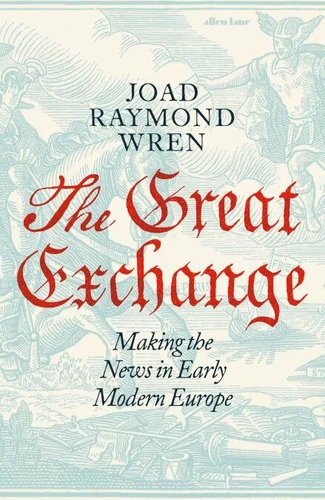The Great Exchange: Making the News in Early Modern Europe
Par :Formats :
Disponible dans votre compte client Decitre ou Furet du Nord dès validation de votre commande. Le format ePub protégé est :
- Compatible avec une lecture sur My Vivlio (smartphone, tablette, ordinateur)
- Compatible avec une lecture sur liseuses Vivlio
- Pour les liseuses autres que Vivlio, vous devez utiliser le logiciel Adobe Digital Edition. Non compatible avec la lecture sur les liseuses Kindle, Remarkable et Sony
- Non compatible avec un achat hors France métropolitaine
 , qui est-ce ?
, qui est-ce ?Notre partenaire de plateforme de lecture numérique où vous retrouverez l'ensemble de vos ebooks gratuitement
Pour en savoir plus sur nos ebooks, consultez notre aide en ligne ici
- Nombre de pages624
- FormatePub
- ISBN978-0-241-18854-5
- EAN9780241188545
- Date de parution10/07/2025
- Protection num.Adobe DRM
- Infos supplémentairesepub
- ÉditeurPENGUIN
Résumé
An epic history of the birth of news in EuropeNews moves. It is a battle, a scandal, a disaster. It is a letter, a newspaper, a proclamation. News is a material thing, but also something between us, something we take into us and feel. This book tells the story of news from the sunset of the Middle Ages to the rise of mass media in modern times. It begins in Renaissance Italy, with the envoys and merchants who drew in and disseminated news across Europe, establishing its channels and conventions.
Following the beat of news around the continent, it uncovers a vast, invisible network traversing the boundaries of geography and politics, religion and language. Joad Raymond Wren allows the reader to see news - of the battle of Lepanto, the siege of Vienna - spreading around this network in real time. Dispelling the tenacious myth that news was until the printing press scarce and unreliable, and until the telegraph slow and provincial, he opens up windows onto a world buzzing with news from faraway.
News brought the distant closer, and provided the means for Europe to know itself. The continent was, for a time, held together by that most essential of human acts: communication.
Following the beat of news around the continent, it uncovers a vast, invisible network traversing the boundaries of geography and politics, religion and language. Joad Raymond Wren allows the reader to see news - of the battle of Lepanto, the siege of Vienna - spreading around this network in real time. Dispelling the tenacious myth that news was until the printing press scarce and unreliable, and until the telegraph slow and provincial, he opens up windows onto a world buzzing with news from faraway.
News brought the distant closer, and provided the means for Europe to know itself. The continent was, for a time, held together by that most essential of human acts: communication.
An epic history of the birth of news in EuropeNews moves. It is a battle, a scandal, a disaster. It is a letter, a newspaper, a proclamation. News is a material thing, but also something between us, something we take into us and feel. This book tells the story of news from the sunset of the Middle Ages to the rise of mass media in modern times. It begins in Renaissance Italy, with the envoys and merchants who drew in and disseminated news across Europe, establishing its channels and conventions.
Following the beat of news around the continent, it uncovers a vast, invisible network traversing the boundaries of geography and politics, religion and language. Joad Raymond Wren allows the reader to see news - of the battle of Lepanto, the siege of Vienna - spreading around this network in real time. Dispelling the tenacious myth that news was until the printing press scarce and unreliable, and until the telegraph slow and provincial, he opens up windows onto a world buzzing with news from faraway.
News brought the distant closer, and provided the means for Europe to know itself. The continent was, for a time, held together by that most essential of human acts: communication.
Following the beat of news around the continent, it uncovers a vast, invisible network traversing the boundaries of geography and politics, religion and language. Joad Raymond Wren allows the reader to see news - of the battle of Lepanto, the siege of Vienna - spreading around this network in real time. Dispelling the tenacious myth that news was until the printing press scarce and unreliable, and until the telegraph slow and provincial, he opens up windows onto a world buzzing with news from faraway.
News brought the distant closer, and provided the means for Europe to know itself. The continent was, for a time, held together by that most essential of human acts: communication.



